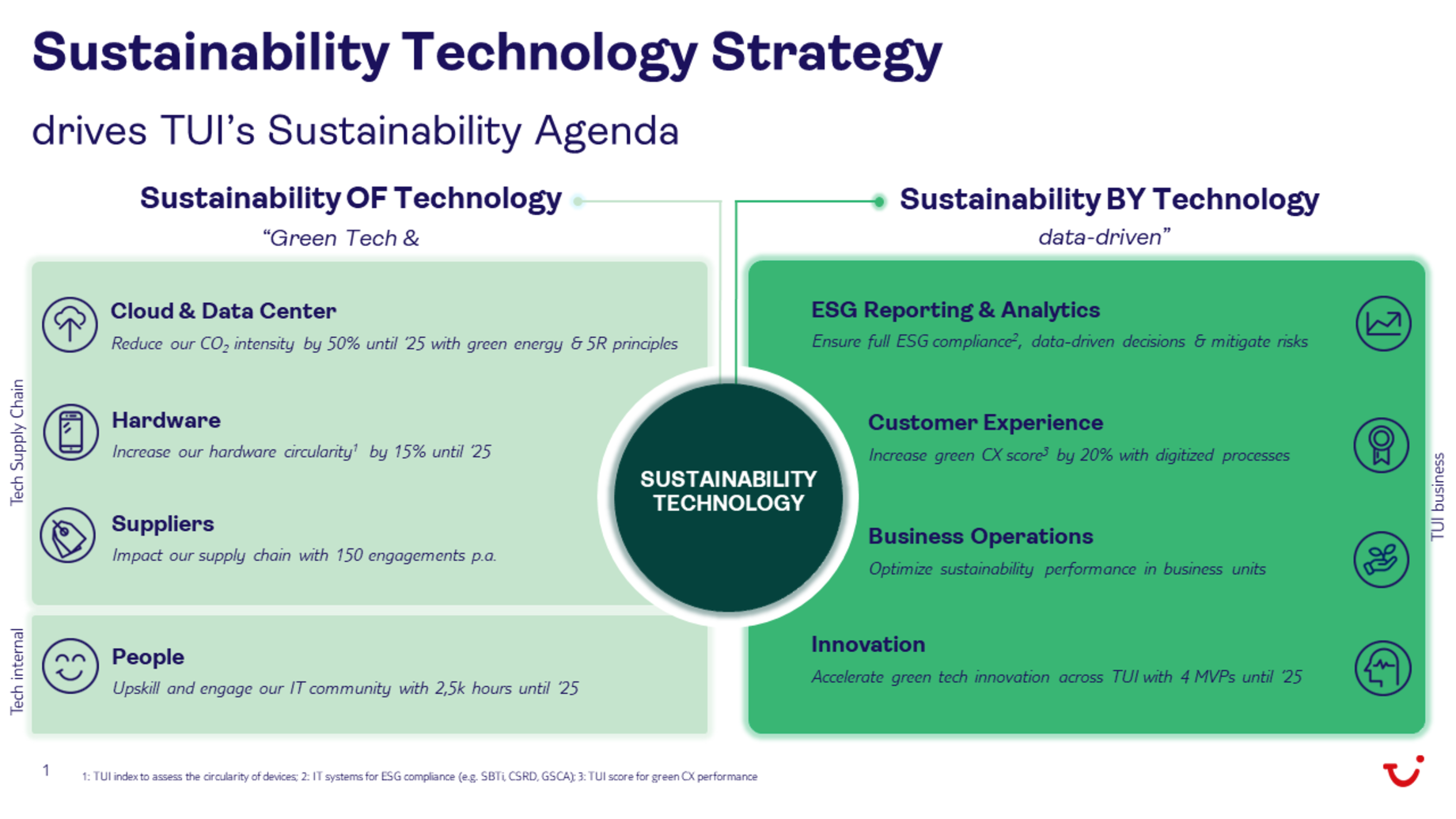TUI has been working on the sustainable transformation of the tourism industry for over three decades. The company's dedication to fostering social and economic development, reducing environmental impact, and fostering industry-wide collaboration stands on a robust framework of strategic pillars (People, Planet, Progress), reflecting its sustainability approach. The year 2023 marked a significant step with the launch of the TUI Sustainability Agenda.
Reducing its own environmental footprint is one of the focus areas within the Sustainability Agenda. TUI has set ambitious emission reduction goals for 2030 and aims to become a net-zero company by 2050 the latest. One focus in TUI’ssustainability journey is the measurement of its Tech carbon footprint. "Understanding Tech’s impact on the environment is critical. By measuring our CO2 footprint, we can implement targeted strategies to significantly reduce our emissions," explains Isabelle Droll, Master Domain Owner at TUI being responsible for sustainability in the Tech Domain Organisation. "This initiative is a cornerstone of our commitment to environmental stewardship and a testament to our leadership in the industry."
Grasping the full scope of TUI's technological infrastructure's environmental impact has been a good challenge, primarily due to the lack of standardized calculation methods and the complexity of data required (from the emissions of our data centers and the cloud to the environmental footprint of mobiles or tv sets in hotel rooms), especially with regards to Scope 3 emissions (e.g. emissions by suppliers). However, TUI has pursued this challenging goal, showcasing a commitment to transparency and accountability. To ensure the approach is in line with industry best practices and international standards, the external agency Atlantic Ventures has been commissioned to create a robust methodology.
Frieder Olfe, Head of Sustainability Technology, reflects on the collective effort: "The collaboration and support from different areas within TUI have been incredible. It's great to see the shared commitment towards our sustainability goals. It is only through our joint efforts that we are able to push the boundaries and set new standards for sustainable practices in the technology space."
This complex project is a testament to TUI's integrated approach to sustainability, addressing both the direct and indirect environmental impacts of its technological assets. The process of calculating the Tech Carbon Footprint involved phases of scope definition, data collection, and sophisticated calculation methods. TUI's pioneering work in this area is not just about achieving internal benchmarks; it's about contributing to a larger dialogue on tech sustainability.
The detailed analysis provided by the Tech carbon footprint has also enabled a more strategic decision-making within TUI Tech. Based on the results an emission reduction target was set for Data Center & Cloud aiming for 50% reduction of CO2e intensity until 2025. The project's insights have also spurred TUI`s tech teams to prioritize circularity over mere energy efficiency in its approach to managing end user devices. "Our data shows that the lion's share of emissions from end user devices occurs during manufacturing and transport. With this knowledge, we are now redirecting our efforts to emphasize circularity," Isabelle Droll elaborates. "This shift not only aligns with our long-term emission reduction goals but also supports a broader vision of sustainable resource utilization” Lastly the data showed the dependency on IT suppliers who need to shift towards sustainability and increasedata transparency. “Together with our IT Procurement, we will leverage our buying power to impact our supply chain – sustainability is now part of our investment decisions and we will increase the dialogue with our suppliers on this,” says Isabelle Droll.
As TUI continues to lead by example, its Tech carbon footprint initiative stands as a progressive model for the industry. The project is not just a measurement – it's a movement towards a more sustainable future, propelled by data, innovation, and a collective commitment to change.




 Austria
Austria

